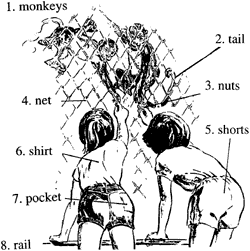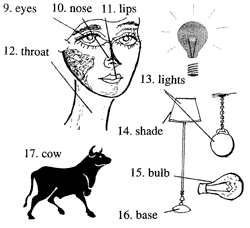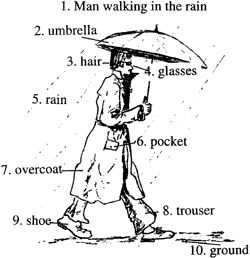Unit 14: Relative Pronouns
Pronombres relativos
Pictured Words
Palabras Representadas

| 1. monkeys
1. monos |
| 2. tail
2. cola |
| 3. nuts
3. semillas de los frutos del arbols; tuercas |
| 4. net
4. red |
| 5. shorts
5. shorts |
| 6. shirt
6. camisa |
| 7. pocket
7. bolsillo |
| 8. rail
8. carril |

| 9. eyes
9. ojos |
| 10. nose
10. nariz |
| 11. lips
11. labios |
| 12. throat
12. garganta |
| 13. lights
13. oscuro – ligero |
| 14. shade
14. cortina |
| 15. bulb
15. bulbo |
| 16. base
16. base |
| 17. cow
17. vaca |
New Words
Nuevas Palabras
Nouns
Sustantivos
cubierta
medida
cielo
tiempo
vaca
posición
sonido
viento
polvo
arena
vuelta
mirada
tamaño
manera
Adjectives
Adjetivos
negro - blanco
débil - fuerte
redondo
agudo
común
por completo
listo
extraño
complejo - simple
verde - azul
débil
Sayings
Refranes
With whom are the boy and girl playing?
¿Con quién el muchacho y la muchacha están jugando?
Whose nuts seem better to the children?
¿De quién tuercas se parecen mejores a los niños?
Why should they do this to them?
¿Por qué deben hacer esto a ellas?
Who is lovely?
¿Quién es encantador?
We take pleasure in those whose eyes are full and round.
Tomamos placer en los que ojos sean llenos y redondos.
Turn the light on, please.
Encienda la luz , por favor.
What will make the room bright?
¿Qué hará el cuarto brillante?
Whoever does it will seem strange.
Quienquiera él se parecerá extraño.
Relative Pronouns
Pronombres relativos
In this story we see some examples of these pronouns:
En esta historia vemos algunos ejemplos de estos pronombres:
Who is greatest in the kingdom of heaven?
¿Quién es la más grande del reino del cielo?
whoever then will make himself as low as this little child
quienquiera entonces se hará tan bajo como este pequeño niño
whoever is a cause of trouble to one of these little ones
quienquiera es una causa del apuro a uno estos pequeños
who have faith in me
quiénes tienen fe en mí
There other relative pronouns like "who" and "they" may best be put in a Table:
Allí otros pronombres relativos tienen gusto "quién" y "ellos" bien puede ser puesto en una tabla:
Relative Pronouns can be singular or plural
Los pronombres relativos pueden ser singulares o plurales
| WHO
Who | form for subject - "persons"
forme para el tema - las "personas" |
| WHO(M)*
WHO(M) * | form for object
forme para el objeto |
| WHOSE
CUYO | form for possessive adjective
forme para el adjetivo posesivo |
| WHICH
CUÁL | form for subject or object - "things"
forme para el tema u opóngase - las "cosas" |
| WHAT
QUÉ | form for subject or object - "that which"
forme para el tema u opóngase - "el que" |
*whom is not usual in talking and writing.
* quién no es generalmente en hablar y escribir.
These words take the place of a noun or pronoun that has already been said and so they are called relative pronouns: they relate to those other "things".
Estas palabras toman el lugar de un sustantivo o de un pronombre que se ha dicho ya y así que se llaman los pronombres relativos: se relacionan con esas otras "cosas".
They are used in a statement to give extra knowledge of what is talked about in it.
Se utilizan en una declaración dan el conocimiento adicional de qué se habla en él.
A relative pronoun may be the subject or the object of the statement, but it always comes at its start.
Un pronombre relativo puede ser el tema o el objeto de la declaración, pero viene siempre en su comienzo.
"Who" is used for persons and "which" is used for animals or things.
"quiénes" se utiliza para las personas y "que" se utiliza para los animales o las cosas.
They may be either singular or plural.
Pueden ser singular o plural.
If the statement does not need to say something about a previous noun or pronoun, "who" or "which" may have the words "this" or "those" before them:
Si la declaración no necesita decir algo sobre un sustantivo o un pronombre anterior, "quién" o "que" puede tener las palabras "esto" o "ésas" antes de ellos:
those who go to her do not come back again
los que van a ella no se vuelven otra vez
those who have given me their love are loved by me
los que me han dado su amor son amaron por mí
those who had taken us prisoner made request for a song
los que nos habían tomado el preso hicieron el pedido una canción
those who had taken away all that we had gave us orders
los que habían quitado todos que teníamos nos dieron órdenes
If these statements had been for one person "this" would have been used in place of "those".
Si estas declaraciones hubieran estado para una persona "esto" habría sido utilizada en lugar de "ésos".
The possessive adjective "whose", may be used for both persons and things.
El adjetivo posesivo "que", puede ser utilizado para las personas y las cosas.
Like the other relative forms it is put before the statement and the noun it is referring to comes after it, whether that noun is the subject or the object:
Como las otras formas relativas se pone antes de que la declaración y el sustantivo que se está refiriendo venga después de ella, si ese sustantivo es el tema o el objeto:
those whose words are false
los que palabras son falsas
those whose acts are false
los que actos son falsos
he whose heart is glad has an unending feast .
él que corazón está alegre tiene un banquete interminable.
he whose ways are upright will go safely.
él que maneras son voluntad vertical va con seguridad.
those whose acts are true are his delight
los que actos son verdades son su placer
The other word in our Table is "what".
La otra palabra en nuestra tabla es "qué".
It has the sense of "that which":
Tiene el sentido de "eso que":
I will say what I have.
Diré lo que tengo.
who is able to keep from saying what is in his mind?
¿quién puede guardar de decir cuál está en su mente?
I will not say what is false to your face.
No diré cuál es falso a su cara.
"What" may also be used when a question is asked:
"qué" puede también ser utilizado cuando se hace una pregunta:
what am I to give you?
¿cuál soy para darle?
what is the upright man to do?
¿cuál es el hombre vertical a hacer?
what is man?
¿cuál es hombre?
what is it to him?
¿cuál está a él?
what were all those herds which I saw on the way?
¿cuáles eran todas esas manadas que vi en la manera?

| 1. man walking in the rain
1. hombre que camina en la lluvia |
| 2. umbrella
2. paraguas |
| 3. hair
3. pelo |
| 4. glasses
4. cristales |
| 5. rain
5. lluvia |
| 6. pocket
6. bolsillo |
| 7. overcoat
7. sobretodo |
| 8. trousers
8. pantalones |
| 9. shoe
9. zapato |
| 10. ground
10. tierra |
A Great Rain
Una Gran Lluvia
Then Elijah said to Ahab, Up!
¡Entonces Elijah dicho a Ahab, encima de!
take food and drink;
alimento y bebida de la toma;
for there is a sound of much rain.
para hay un sonido de mucha lluvia.
So Ahab went up to have food and drink, while Elijah went up to the top of Carmel;
Ahab fue tan hasta tiene alimento y bebida, mientras que Elijah fue hasta la tapa de Carmel;
and he went down on the earth, putting his face between his knees.
y él fue abajo en la tierra, poniendo su cara entre sus rodillas.
And he said to his servant, Go now, and take a look in the direction of the sea.
Y él dijo a su criado, ahora va, y toma una mirada en la dirección del mar.
And he went up, and after looking said, There is nothing.
Y él fue para arriba, y después de mirar dijo, allí no es nada.
And he said, Go again seven times;
Y él dijo, va otra vez siete veces;
and he went seven times.
y él fue siete veces.
And the seventh time he said, I see a cloud coming up out of the sea, as small as a man's hand.
Y la séptima vez él dijo, yo ve una nube el salir para arriba el mar, tan pequeño como la mano de un hombre.
Then he said, Go up and say to Ahab, Get your carriage ready and go down or the rain will keep you back.
Entonces él dijo, vaya para arriba y diga a Ahab, consigue su carro listo y va abajo o la lluvia le guardará detrás.
And after a very little time, the heaven became black with clouds and wind, and there was a great rain.
Y después de un rato muy pequeño, el cielo llegó a ser negro con las nubes y el viento, y había una gran lluvia.
And Ahab went in his carriage to Jezreel.
Y Ahab entró en su carro a Jezreel.
And the hand of the Lord was on Elijah;
Y la mano del señor estaba en Elijah;
and he made himself strong, and went running before Ahab till they came to Jezreel.
y él se hizo fuerte, y fue a funcionar antes de que Ahab hasta que vinieron a Jezreel.
Additional Reading
Lectura Adicional
In the country where Elijah was living the weather is of special interest.
En el país en donde vivía Elijah el tiempo está de interés especial.
It is quite common to have rain clouds go across the whole sky in a very short time.
Es absolutamente común hacer que las nubes de la lluvia vayan a través del cielo entero en un rato muy corto.
They seem to come up from the sea as a little bit of cloud which is of no size at all in that great stretch of blue sky.
Se parecen venir para arriba del mar como un poco de la nube que está de ningún tamaño en todos en que grande estire del cielo azul.
But it becomes rain in a very short time.
Pero se convierte en lluvia en un rato muy corto.
It seems only a few minutes.
Se parece solamente algunos minutos.
People who are living under those weather conditions will make for some kind of cover so soon as they see such a cloud starting to come into the sky.
La gente que está viviendo bajo esas condiciones atmosféricas hará para una cierta clase de cubierta tan pronto como ella ve tal nube el comenzar a venir en el cielo.
This is the sort of weather that is named Mediterranean by the experts.
Ésta es la clase de tiempo que sea nombrado Mediterranean por los expertos.
But do not put that word in your memory just yet.
Pero no ponga esa palabra en su memoria apenas todavía.
The point about this story is that there had been no rain for more than three years.
El punto sobre esta historia es que no había habido lluvia por más de tres años.
It seems strange to us that Elijah knew when it would rain.
Se parece extraño a nosotros que Elijah sabía cuándo llovería.
He went up to the top of the mountain above the sea to get ready for the coming of the rain, and he sent word to Ahab.
Él fue hasta la tapa de la montaña sobre el mar a conseguir listo para venir de la lluvia, y él envió palabra a Ahab.
He even sent his servant to keep watch for its coming.
Él incluso envió a su criado al reloj de la subsistencia para su venir.
He was told by God that this rain would come.
God le dijo que viniera esta lluvia.
It put Elijah in a very important position in his relation with Ahab to be able to say to him, before it came about, that the rain would come and be so destructive that he would need to get away to a safe place.
Puso Elijah en una posición muy importante en su relación con Ahab para poder decir a él, antes de que viniera alrededor, que la lluvia vendría y sería tan destructiva que él necesitaría conseguir lejos a un lugar seguro.
And this is what Ahab did.
Y esto es lo que lo hizo Ahab.
There are many pictures of the prophet Elijah running before Ahab's carriage through the driving rain, with his hair flying behind him and the light of purpose on his face.
Hay muchos cuadros del profeta Elijah que funciona antes del carro de Ahab a través de la lluvia que conduce, con su vuelo del pelo detrás de él y la luz del propósito en su cara.
He got his full measure of effect on Ahab and sent him the word that God was in control of all his designs.
Él consiguió su medida completa de efecto sobre Ahab y le envió la palabra que el dios estaba en el control de todos sus diseños.
Helpful Notes
Notas Provechosas
| keep watch
reloj de la subsistencia | having one's eyes open.
teniendo sus ojos ábrase. |
| knees
rodillas | part of the legs of the body.
pieza de las piernas del cuerpo. |
| relation
relación | in hand with.
a disposición con. |
| carriage
carro | a thing for taking a ride.
una cosa para tomar un paseo. |
| picture
cuadro | a story without talking.
una historia sin hablar. |
| clouds
nubes | soft bodies in the sky above us.
cuerpos suaves en el cielo sobre nosotros. |
| mountain
montaña | a very high place.
un lugar muy alto. |